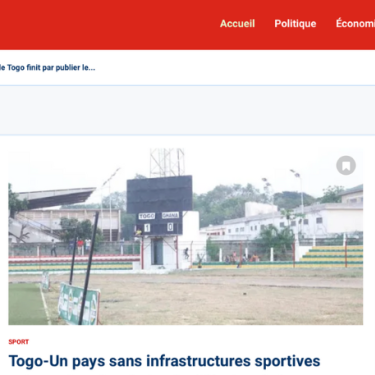Iconic Togolese investigative media outlet relaunched with RSF’s support

With support from Reporters Without Borders (RSF) against a backdrop of unprecedented attacks against media in the Sahel, Togo’s leading investigative newspaper, L’Alternative, has resumed operating as a website, one year after being forced to close when its publisher and editor fled the country.
With an RSF support grant and a revamped and more secure website, L’Alternative is again ready to provide its readers with investigative reporting, and it started today, 7 March, a date destined to go down in the history of the freedom to inform and media pluralism in Togo.
L’Alternative stopped publishing in March 2023 when its publisher and editor were forced to flee shortly before a court passed jail sentences on them, and an international warrant was issued for their arrest. The newspaper had previously managed to keep appearing in December 2021, when they were jailed on a charge of “contempt of authority” over an investigative video report on YouTube.
Investigative journalism is necessary to expose facts that some leaders wish to hide. The courage of investigative reporters helps to defend the right to information, as L'Alternative has demonstrated by the important role it has played in Togo. It was essential that this investigative newspaper should not disappear, which is why RSF decided to help relaunch it so that it could recover its prominent place in the media landscape.
Created as a bi-weekly newspaper in April 2008, L’Alternative began reaching more readers when an online version was launched. It was founded by Togolese investigative journalist Ferdinand Ayité, who was subsequently joined by Isidore Kouwonou, who became its editor.
With a staff of ten journalists, L’Alternative was able to produce in-depth reports and publish major investigations. As part of the Swissleaks project, it exposed the routes taken by Togolese capital as it flees abroad, especially to Switzerland, in 2012. Three years later, as part of the Panama Papers, L'Alternative worked with the French newspaper Le Monde in exposing the complex financial circuits used by the two foreign owners of a cement factory in which a former Prime Minister was a shareholder. Its investigation into the large sums being embezzled in connection with the importation of petroleum products, called Petrolgate, had a big impact on Togolese public opinion in 2020.
As a result of the many revelations and investigations, the authorities turned their sights on L’Alternative and its management, and it was suspended several times by the High Authority for Communication (HAC). Administrative sanctions, legal proceedings and surveillance ensued, and Ayité and Kouwonou continue to be the subject of an international arrest warrant.
New departure
But the fight for media freedom and independence continues to drive L’Alternative’s journalists. Ayité is now based in Paris while his editor, Kouwonou has moved to Dakar, the Senegalese capital, from where the editorial operation will now be run with “the same commitment as at the start,” says Kouwonou, who still has around ten reporters, some of them based in Togo.
“It is the love we have for our country and the passion we have for this profession that keeps us going despite this ordeal,” Kouwonou said. “We have kept the flame alive even after a year of absence.”
And what is L’Alternative planning to investigate?
“We are currently preparing an investigation into corruption in phosphate mining in Togo and an investigation into the Gnassingbé family that has ruled Togo for 58 years,” Kouwonou said. “This will be the first investigation that we will publish using the site’s new format.”
